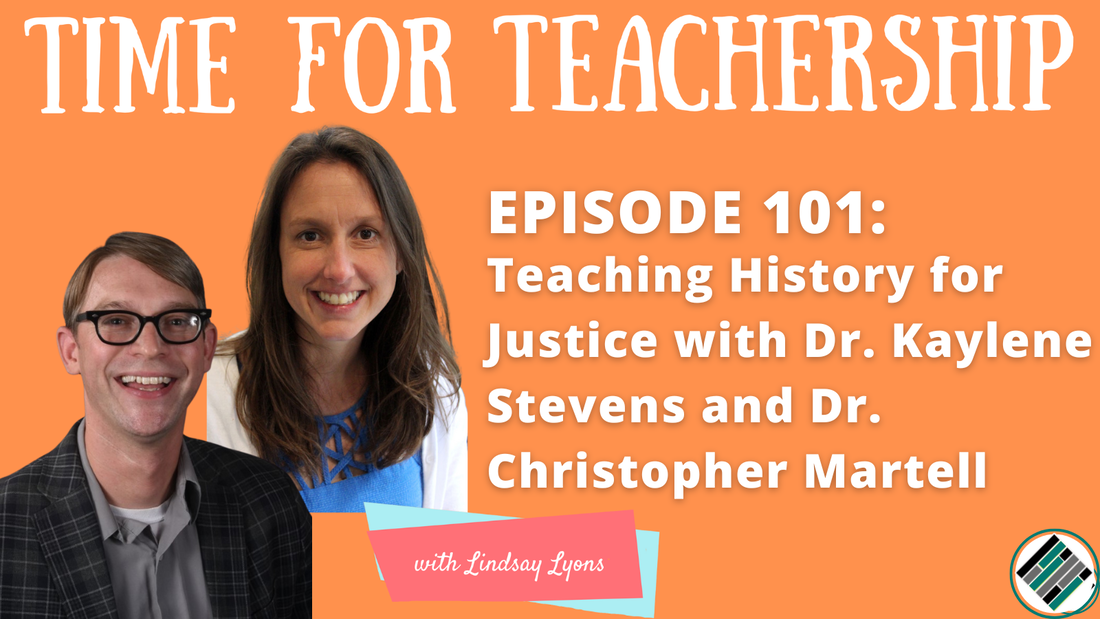|
2/6/2023 101. Teaching History for Justice with Dr. Kaylene Stevens and Dr. Christopher MartellRead Now
Listen to the episode by clicking the link to your preferred podcast platform below:

Former social studies teachers, current university professors, and co-authors of the book "Teaching History for Justice: Centering Activism in Students' Study of the Past,” Dr. Kaylene Stevens and Dr. Christopher Martell talk about how and why we need to teach justice, activism, and movement building in schools. They jump right into the conversation by giving credit to all of the teachers they’ve researched and learned with. I absolutely loved their book, so it’s no surprise I also loved this conversation.
The Big Dream The values of our country will change if we teach for justice! Survey data shows that the majority of people in power in the United States think everything’s okay (i.e., race, gender, and class-based oppression are not issues.) Most teachers are still white despite most students being students of color, so there’s hope that white teachers can be activists and antiracists. Alignment to the 4 Stages: Mindset, Pedagogy, Assessment, and Content Mindset is foundational for all of the other stages. Each of the stages are like buckets. The book is intended to be practical, offering a “how” to teach for justice, which is often overlooked in academia. Kaylene encouraged educators to think deeply about the content addressing justice and joy. Chris pointed out these 4 buckets can be done in an anti-oppressive way or an oppressive way. So, educators can be self-reflective and thoughtful about our positionalities. Their framework also supports a problem-solving pedagogy (Freire). Given oppressive laws and book-banning, it’s important to know the context in which you work and identify allies to do this work collectively. We can start local! We want to teach our students to be activists, but we don’t necessarily need to tell them what to care about. It’s about teaching students to use the levers of democracy to make changes. Teachers can be renegades (Agarwal-Rangnath) or subversives depending on the context and limitations of your state’s legislation. Teaching is a political act. It doesn’t need to be partisan. We do this for the students! Action Steps Step 1: Communicate with families and caretakers. If families are concerned, listen to those individuals. After a conversation, families often realize Step 2: Create or join a community of educators/learners. Reach out to others who are doing this work. Listen to BIPOC teachers. Pick one text a year on a topic that you don’t know a lot about. Get students out in the community (e.g., field trips, invite community members into class as guests, family/community interviews). Research shows one of the biggest ways to combat “-isms” is exposure. Step 3: Trust students. Students can use the tools of doing historian work to make the world a better place. We should try to get schools to look more like life than machines. We need to be comfortable with students wanting to change our society’s systems. We can invite debate-oriented pedagogy and give students a chance to bring their own opinions into the class. One Step (or Two) to Get Started Figure out where you are and go from there. Read one of the recommended books below! Think about the complexity of our social identities (and the intersectionality of these identities) as we plan curriculum and do this work. Stay Connected You can find this week’s guests on the following platforms: Dr. Kaylene Stevens:
Dr. Christopher Martell:
Referenced Links and Recommended Readings: Teaching History for Justice book Racial Literacies and Social Studies book Critical Race Theory and Social Studies Futures book Intersectionality Matters podcast Visions of Education podcast episode with Dr. Kaylene Stevens Bettina Love website To help you implement teaching for justice, I’m sharing my _____ with you for free. And, if you’re looking for more details on the ideas in this blog post, listen to episode 101 of the Time for Teachership podcast. If you’re unable to listen or you prefer to read the full episode, you can find the transcript here. Quotes:
Want to continue learning more about teaching history for justice? Watch this video on culturally responsive and sustaining education:
0 Comments
Leave a Reply. |
Details
For transcripts of episodes (and the option to search for terms in transcripts), click here!
Time for Teachership is now a proud member of the...AuthorLindsay Lyons (she/her) is an educational justice coach who works with teachers and school leaders to inspire educational innovation for racial and gender justice, design curricula grounded in student voice, and build capacity for shared leadership. Lindsay taught in NYC public schools, holds a PhD in Leadership and Change, and is the founder of the educational blog and podcast, Time for Teachership. Archives
May 2024
Categories |

 RSS Feed
RSS Feed